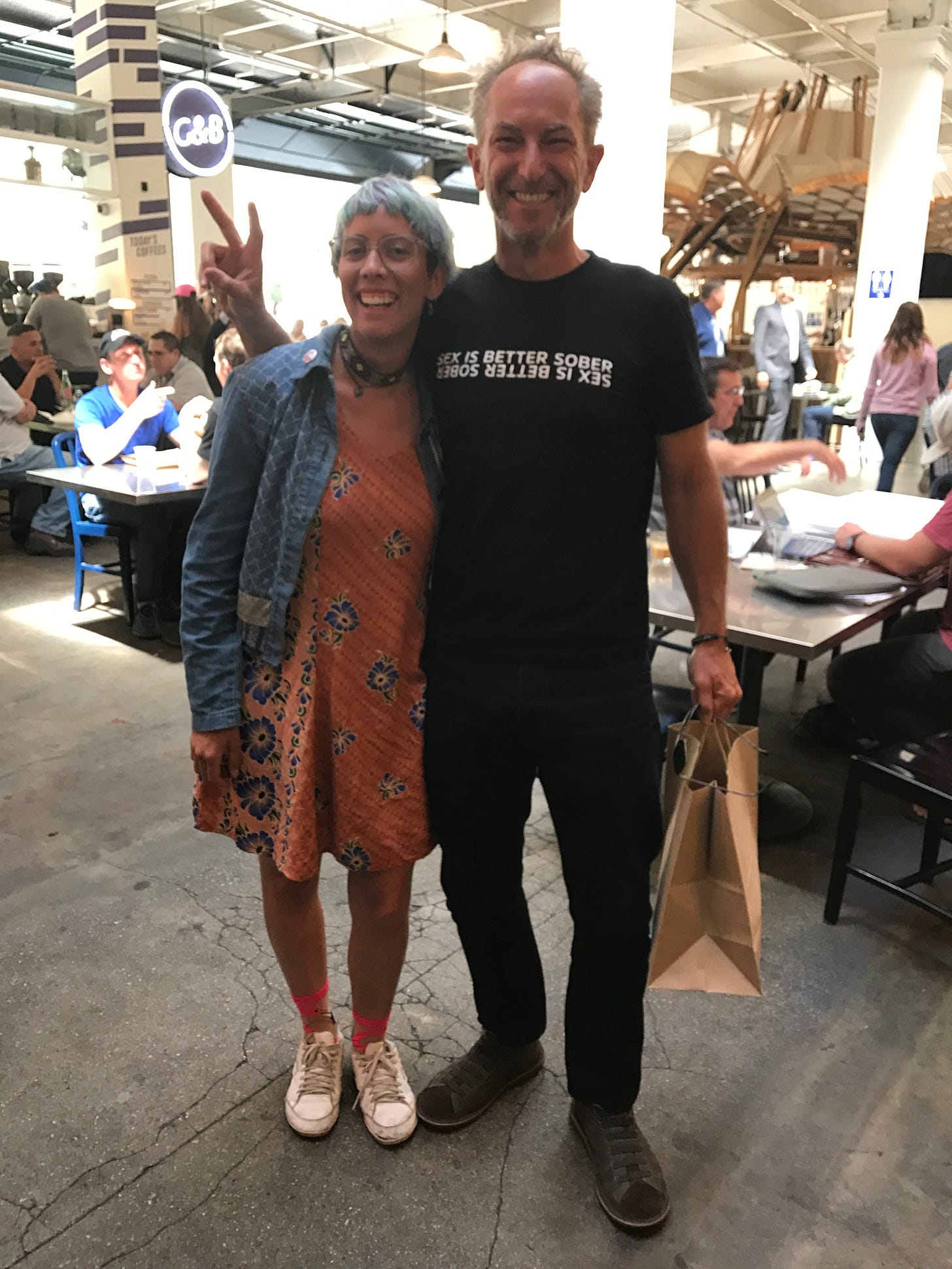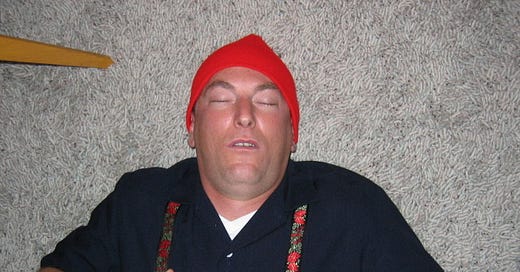Sex is Better Sober ...and 23 other reasons why Alcohol is Obsolete
From depression and alcohol to spontaneous sobriety
This is not part of my book-length memoir An Ordinary Disaster—but if you dig my writing, you should be sure to check that out!
I’m glad you’re here! And—this is a reader-supported publication. If you appreciate my work, please consider becoming a paying subscriber. As a full-time working writer, I appreciate every reader and everyone who chooses to part with five bucks a month to support my writing. Almost all of this Substack remains free; only contribute money if you feel inclined to do so, but there are a few things that I make available only to paying subscribers, like my long-form handbook on intuition.
I like to use the word obsolete to refer to something that’s perhaps not quite already entirely of the past but that’s on its way out, that should be gone soon, and that I am choosing to remove from my consciousness. By declaring something obsolete I’m no longer referring to it as present in my life.
I did this 5+ years ago when I decided that, for me, “alcohol is obsolete.” That doesn’t even necessarily mean that I’ll never drink any alcohol again, just that it’s not much of a factor in my present consciousness, and although you can find plenty of my writing about my experience in changing my relationship with alcohol here on my Stack, it doesn’t come up much for me on a day to day basis. If people ask, I’m happy to discuss, but... for the most part, it’s just gone.
Depression && Alcohol → Spontaneous Sobriety
When I the connection between depression and drinking alcohol finally became clear to me, I wasn't so much tired of drinking as I was tired of feeling depressed, but I was happy to stop drinking, knowing that it would remove a very significant, and perhaps the last, ongoing depressive influence on my psyche.
I didn’t check myself in to any sort of rehab. I didn’t start going to any meetings or join a group. I didn’t seek any help at all in fact, aside from my girlfriend at the time giving it a rest along with me. I just stopped, at first for a week, and then for a month, and then on an ongoing basis. After a month or so, I happened upon a copy of This Naked Mind, and was happily surprised to find confirmation of some of what I’d arrived at myself intuitively, and some concrete discussion of the neuro-biological aspects of how alcohol works in the body, as well as how the meat of the brain grows to embody habits as they are formed.
I looked back at my journal just now and I can see that I started assembling this list long before I came across Annie’s book, but I also recall that one of her methods is to make a list of things that start to become clear about your actual experience with alcohol after a period of abstinence—things that may be quite different from your past experience.
It hasn’t been that much of a struggle for me to change my patterns, not even in the first days, weeks, or months, but having a list of handy reminders has proved to be a huge help overall, and over time, not only it did occur to feel like necking one at the end of the day. This list is a great reminder of what is true for me now, and also of all the things that weren’t clear to me for so long, both because alcohol was inhibiting my perception and understanding of my own self, and because that sense of self—or intuition—was, for me, poorly developed from the start.
My Twenty Reasons that Alcohol Became Obsolete
What feels good about alcohol is actually just the first few minutes—after that, not so much.
Alcohol is not my “friend” — even though it often substituted for friends, and kept me from having better more fulfilling friendships.
I need 100% of myself, every day.
I don’t have time to waste.
I’m setting a higher standard, for myself, from now on.
Alcohol is a waste of money—and I sure do love saving all that cash I used to spend on wine and cocktails!
I don’t want to celebrate with alcohol. Why does a party or a milestone require or deserve a “drink”?
I look like a child with a bottle always in hand.
I want to experience things fully, and alcohol dulls, restricts, and limits my experience. Adding alcohol doesn’t add to my experience.
I don’t want to avoid anything (and I know that alcohol was pretty fucking great at helping me avoid all sorts of things!)
Drinking often feels like giving up.
I want to quit while I’m ahead, and avoid taking that ‘one last run’ on the ski hill that results in a broken leg.
I don’t want to be the old guy at the party — not a good look.
I sometimes think I might not be strong enough to do things without alcohol, but I am.
It’s an intelligence test.
If I get asked ‘What are you drinking?’ (and I never do), my response can be, “well, what are you drinking?”
I’ve already tried all the delicious wines and beers. I don’t need to “try” one or a hundred more because they might be tasty. Whatever.
I'll never have another hangover—and that alone is reason enough.
I don’t have kids of my own, but I want to be a better example for friends’ kids — I don’t want to be the uncle that shows up and gets drunk with dad.
I have nothing left to learn from alcohol
I want to change my pattern of how alcohol plays a role in my relationships
I admire men who have chosen not to drink
I don’t want to be “waiting for something bigger” any longer — see Caroline Knapp, and Bill Moyers
and, of courseSex is better sober, and I don’t just mean the sex itself. If you’re used to having sex, and/or getting to sex under the influence, you might think (as I did for much of my younger years) that it’s better, or perhaps even only really possible under the influence. Give it a try for a month or so, and let us know how it goes.
You should know that:
If you’re wondering whether you have a problem with alcohol, here’s what really matters: it’s up to you, and if you’re wondering, that’s all you really need to know. It doesn’t really matter whether you have a “problem,” by anyone else’s definition. What matters is that you are noticing a desire to change something, and if you’re feeling that, the right thing to do is to respect the message. You have the freedom to align our behavior with your own well-being.
Change is easier than you think. Whether or not you are, or think you are “addicted,” doesn’t matter much either. Addiction is a habit, and habits are formed—and unformed—by repetition. If you practice drinking, you’ll get good at it, and you’ll form a habit. If you practice not drinking, you’ll almost certainly get good at that too.
You don’t need to go to “AA.” You can if you want to, but if it doesn’t appeal to you, find something else. While AA has helped a lot of people, multiple studies have shown repeatedly that there’s no evidence that AA really works aside from as a support group of like-minded peers. Being part of a group is great, and it does help. Find one that you like, whatever that is.
By “sober” I don’t necessarily mean 100% never ever, never again, or straight-edge. I talk about this a fair bit in Five Years Sober* (and there’s a reason there’s an asterisk there on “Sober*”), as well as in my interview with Dr. Adi Jaffe, author of The Abstinence Myth. As for me, at the moment, I don’t drink alcohol at all, but I do enjoy low-dose (2.5mg) edible cannabis fairly often. I have used various psychedelics at times, but I don’t do that at all at the moment either.
Read! see below, especially the first five books.
If you want or need additional, one-on-one help, there are of course lots of programs, counselors, and coaches (clearly, not an exhaustive list). I also offer my own Guide Service, which focuses on developing and strengthening the relationship with self, with intuition, and with a deep sense of integrated mind-body well-being.
This is part of a series of short meditations, maxims and mottoes that appear on my Substack along with my memoir in progress, essays, and podcast.
Further Reading
I’m writing a memoir which deals with all of this material in much greater detail. I’ve published several chapters here on Substack already.
You might be also interested in some of my other writing on alcohol, especially these Change of Heart, A Five-Minute Love Affair With Natural Wine, and Five Years Sober*.
who writes here on Substack and her book Quit Like a Woman: The Radical Choice to Not Drink in a Culture Obsessed with Alcohol and wrote this in celebrating ten years of sobriety:My own podcast with
on "Coming Out and Letting Go," including letting go of alcoholI also recommend these fine books on alcohol and addiction:
Stanton Peele, Love and Addiction
Dr. Adi Jaffe, The Abstinence Myth — and my interview with him
Annie Grace, This Naked Mind — my favorite book on how to change your relationship with alcohol
Johann Hari, Lost Connections
Caroline Knapp, Alcohol, A Love Story
Maia Szalavitz, Unbroken Brain
David Poses, The Weight of Air: A Story of the Lies about Addiction and the Truth about Recovery
Leslie Jamison, The Recovering: Intoxication and Its Aftermath
Carl Erik Fisher, The Urge: Our History of Addiction
Marc Lewis, The Biology of Desire: Why Addiction Is Not a Disease
Mary Carr, Lit
Charlie Engle, Running Man
Amy Dresner, My Fair Junkie: A Memoir of Getting Dirty and Staying Clean

…Please stick around, I’ve got some questions for you:
What is your own relationship with alcohol, and how has the relationship changed over time?
Do you have a list of reasons for not drinking (or drinking) alcohol—or for anything else?
Have you ever felt the urge to drink come and go and change over time?
What’s one way that you’ve experienced a major change in yourself?
Is there anything about how you are living now that you would like to change?
What other books and resources have been helpful for you on the subject of alcohol, addiction, and recovery?
T-shirts!
You can get your very own SEX IS BETTER SOBER t-shirt right here.







Yes! This Naked Mind transformed my relationship with alcohol. July 1, 2017! I was just. so. DONE. I like the word "obsolete". I could never have "just one." It was so annoying to vow every day to drink less, and end up with a drink in hand come 5:30. I wasn't really in control--it was in control of me. And NO MORE HANGOVERS. Honestly just thinking about having one is enough to put me off my wondering if I should try a glass of something now and then!
Love that picture-you must have been a blast to get hammered with! Alcohol is fun 🤩 as long as no one loses an eye-that’s the problem. Is it worth the aftermath? I think not. “Get high on your own supply” “Straight street that great street “ when I decide not to drink you are one of the people I see in my minds eye-thanks 🙏🏻 I’m going to use the six questions as a template for my own Stack. Cheers!